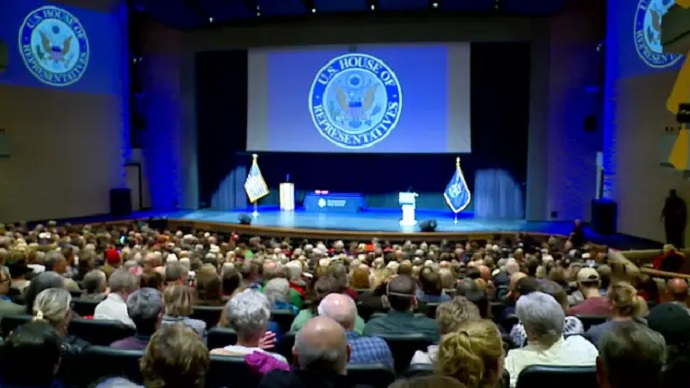Grand Rapids, Mich. – A packed auditorium at Grand Rapids Christian High School served as the backdrop for an intense and emotional town hall meeting hosted by U.S. Representative Hillary Scholten, D-Grand Rapids, on Thursday evening. With over 1,000 attendees, the event provided a platform for residents to voice concerns on a wide range of topics impacting their lives.
Scholten, the only member of Congress from West Michigan holding in-person town halls, acknowledged the frustration and anxiety many were feeling as she opened the meeting. “I know you’re tired, I know you are angry, and I know you are scared,” Scholten said, empathizing with the crowd. “That is why I wanted to come here tonight in person.”
The evening unfolded in an open Q&A format, where constituents took the opportunity to ask direct questions and share their worries. Outside, the energy was palpable, as a long line of people stretched along the sidewalk, waiting for a chance to be heard.
Among the crowd was Ada resident Marcie Beck, who expressed deep concern about the future of the Great Lakes. Beck, a staunch environmental advocate, worried that recent cuts to the Environmental Protection Agency (EPA) would negatively impact the preservation of the lakes, which are vital to the region’s ecosystem and economy. “The Lakes are a treasure, and we need to protect them and take care of them. And we can’t do that without federal support,” Beck explained.
As national policy continues to evolve under the current administration, many in the room spoke out about the broader uncertainty they felt about the future. Topics ranged from the economy and immigration to Social Security and the state of democracy itself.
Amanda Steck, a former employee of the U.S. Agency for International Development (USAID), shared her personal struggles after the agency’s dismantling under the previous administration. With 15 years of experience working at USAID, Steck explained how the agency’s dissolution not only affected her career but also the agricultural sector in Michigan. “USAID worked with several large-scale farmer organizations in Michigan,” Steck said, noting the impact that the loss of such programs has had on the state’s farming community.
Chris Talsma-Mclean, who works in the public health industry, also shared her concerns. Talsma-Mclean’s company had to lay off thousands of federal contractors due to recent budget cuts. She voiced her anxiety over the consequences of these reductions on underserved populations who depend on federal health services. “I am concerned about the people we serve, the underserved and the Medicare and Medicaid people who depended on information and services that we provided,” she said.
Despite these challenges, many constituents, like Steck, expressed support for Scholten’s work in Congress but urged the Democratic Party to think outside the box. “I need them to get creative. I need them to do more,” Steck remarked. “We are in a unique moment in our history, and the Democrats have got to step up.”
As the town hall drew to a close, it was clear that Scholten’s approach of meeting constituents face-to-face allowed for open dialogue in a time of great uncertainty. With a wide variety of concerns shared, it was evident that the future of Michigan’s communities hangs in the balance, with many urging both local and national leaders to take bold action on the issues that matter most.







